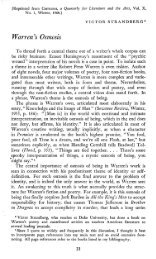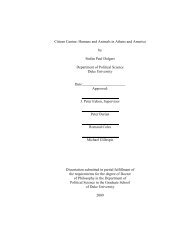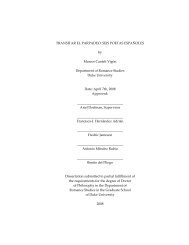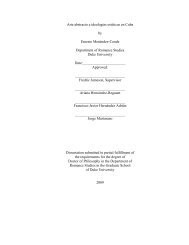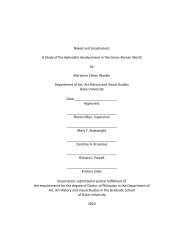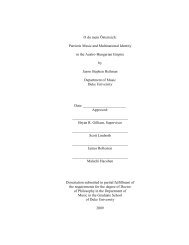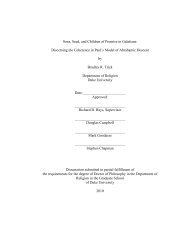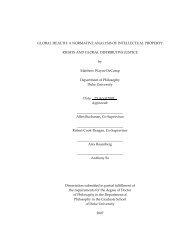View/Open - DukeSpace - Duke University
View/Open - DukeSpace - Duke University
View/Open - DukeSpace - Duke University
Create successful ePaper yourself
Turn your PDF publications into a flip-book with our unique Google optimized e-Paper software.
dominant heterosexual practices. As such, “Beijing Story” and “The Illusive Mind” present<br />
same-sex romance narratives that blur boundaries between homo/heterosexual behavior and<br />
identities. The literary portrayal of performative masculinity and femininity reinscribed within<br />
male tongzhi relations simultaneously homologizes yet differentiates same-sex and opposite-sex<br />
relations, etching a space for non-normative genders and sexualities to emerge.<br />
[“Beijing Story”: Gender Performance to Reenact the Traditional Tragic Love Story]<br />
“Beijing Story” uses fictional representations of homosexuality to challenge the<br />
encroachment of public control into the private lives of Chinese (queer) citizens. On the one<br />
hand, the story situates homosexual identity within heterosexual practices to blur the distinction<br />
between homoerotic and heteroerotic desire. In this way, the narrative anecdotally assimilates<br />
same-sex to opposite-sex relations, elucidating that they are comparable and compatible. On the<br />
other hand, “Beijing Story” accentuates differences between same-sex and opposite-sex intimacy<br />
to display the genuine nature of homosexual love and legitimacy of a discrete tongzhi identity.<br />
Thus, the text represents male-male relations as animated by an incessant drifting between<br />
homosexual and heterosexual subjectivities.<br />
As the first publicly accessible gay love story when it was published and circulated<br />
anonymously on the Chinese internet, “Beijing Story” (1996) spread rapidly through China’s<br />
online community to become one of the most widely read “underground” texts (Kong 2004). 23<br />
The novella, now with Beijing Comrade ( 北 京 同 志 ) 24 attributed as its author, pioneered illicit<br />
publishing on the internet, setting a precedent that has since led to the overwhelming popularity<br />
23 “Underground” here refers to how the text originated from the underground literary world of fiction published<br />
online.<br />
24 Most Comrade stories are published either anonymously or pseudonymously. Beijing Comrade, the author of<br />
“Beijing Story,” and the authors of all Comrade texts discussed in this thesis also follow this practice. Chinese<br />
netizens customarily use nicknames for all online interactions, but on Comrade websites pseudonyms also preserve<br />
anonymity of authors writing about provocative matters, protecting them from legal and social ramifications.<br />
Chapter One | 30



